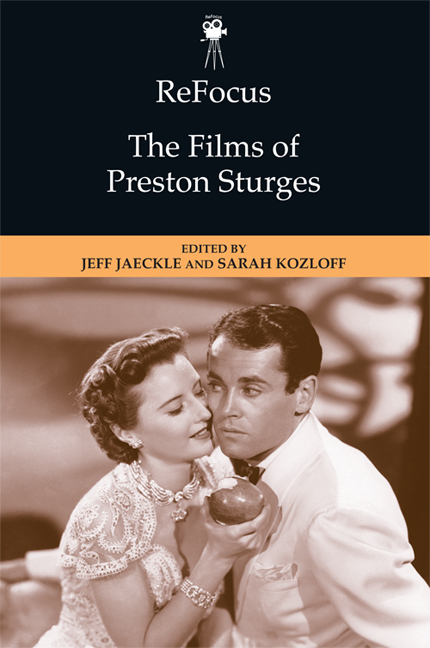Book contents
- Frontmatter
- Contents
- List of Figures
- Notes on Contributors
- Introduction: An Agile Mind—The Many Stands of Preston Sturges
- Part 1 Contexts: Genre, Studio, Authorship
- Part 2 Cultural Commentary: History and Identity
- Part 3 Technique: Scripting, Performance, Music
- 9 The Unheard Song of Joy
- 10 The Eye of the Storm: Preston Sturges and Performance
- 11 Presto(n) con Spirito: Comedies with Music, Sturges-style
- Part 4 Impact: Reception/Reputation
- Index
9 - The Unheard Song of Joy
from Part 3 - Technique: Scripting, Performance, Music
Published online by Cambridge University Press: 05 September 2016
- Frontmatter
- Contents
- List of Figures
- Notes on Contributors
- Introduction: An Agile Mind—The Many Stands of Preston Sturges
- Part 1 Contexts: Genre, Studio, Authorship
- Part 2 Cultural Commentary: History and Identity
- Part 3 Technique: Scripting, Performance, Music
- 9 The Unheard Song of Joy
- 10 The Eye of the Storm: Preston Sturges and Performance
- 11 Presto(n) con Spirito: Comedies with Music, Sturges-style
- Part 4 Impact: Reception/Reputation
- Index
Summary
In the foreword to his posthumously published autobiography, Preston Sturges penned one of the most enduring quips about his filmmaking career: “Between flops, it is true, I have come up with an occasional hit.” James Curtis used this remark as the linchpin for his book Between Flops: A Biography of Preston Sturges, while numerous scholars have replicated this binary of failure and success, in part because it maps so well onto Sturges's filmography. Hits such as The Great McGinty, The Lady Eve, and The Miracle of Morgan's Creek are offset by flops such as The Great Moment, The Sin of Harold Diddlebock, and The Beautiful Blonde from Bashful Bend. Those eager to uphold Sturges as a genius can focus on the string of hits, mostly between 1940 and 1944, while those hoping to account for his misjudgments or loss of talent can concentrate on the flops, which appear regularly after 1944.
In between these much-discussed extremes of hits and flops lie other, unheard projects—some merely incomplete, others painfully aborted. These projects tell different stories, adding nuance and complexity to the familiar arc of Sturges's career. Because they occurred between films, we know less about them, thereby making their study all the more necessary and potentially rewarding. For these reasons, I've chosen to concentrate on a film that never was: Song of Joy, a backstage musical about Hollywood that mixes satire and romance and calls to mind not only Sullivan's Travels but also Going Hollywood (Walsh, 1933), Singin’ in the Rain (Donen and Kelly, 1952), and A Star is Born (Cukor, 1954). Written early in his screenwriting career, in 1935, revised in the midst of his glory days in 1941, and then largely abandoned until his death, Song of Joy is one of the most outlandish and charming screenplays Sturges ever created yet never realized on film (Table 9.1).
Up until recently, no one other than a few executives at Universal, MGM, Paramount, and Fox had seen the script for Song of Joy (which they all rejected); likewise, few film scholars have read it, since it remains unpublished and available in only a handful of libraries, most notably UCLA's Charles E. Young Research Library, which has since 1975 housed the Preston Sturges Papers.
- Type
- Chapter
- Information
- ReFocus: The Films of Preston Sturges , pp. 193 - 210Publisher: Edinburgh University PressPrint publication year: 2015



